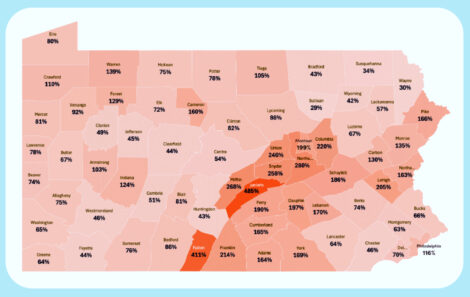Bellefonte previews fire, grant funds in budget discussions
BELLEFONTE — Bellefonte Borough Council continued its 2026 budget discussions this week, focusing on the fire department, equipment and special projects funds during its work session.
Council also advanced plans for a new electricity procurement contract as it navigates challenges related to AI’s impact on local energy rates.
FIRE DEPARTMENT FUND
The Fire Department Fund serves as the operating account for the borough’s fire companies. From it, stipends, property and equipment maintenance, insurance, fuel and other expenses are paid.
According to Financial Director Lori McGowan, “There is no tax increase needed this year.”
That stability comes in part from last year’s tax rate increase from 0.8 to 0.92 mils. It also reflects the shared responsibility in funding fire protection services provided by the Undine and Logan Fire Companies, which is divided among Bellefonte Borough and Benner, Spring and Marion townships.
Bellefonte has proposed contributing $90,844 toward the fund’s projected $260,800 budget.
Because the fire department did not spend all of last year’s stipend, McGowan said they are predicting an income.
“We’re predicting a $53,000 income this year because they didn’t do the physicals or some other things that they didn’t do, so they have plenty of cash to carry that into next year,” she said.
FIRE EQUIPMENT FUND
The Fire Equipment Fund covers the fire companies’ loan payments on their firefighting apparatus. Currently, two outstanding loans remain on vehicles that are still being paid off.
As of late September, those loans total more than $175,000.
In the 2026 projected budget, of the $103,310 to be provided to the companies’ Equipment Fund, $35,816.99 is expected from Bellefonte, $37,241.88 from Benner, $29,451 from Spring and $800 from Marion Township. Marion Township contributes a much smaller portion because fire protection there is mostly limited to Interstate 80.
The contribution to the fund has not been reduced because, according to McGowan, the departments are considering purchasing a ladder truck.
“In the process, we’re transferring that money over into the Capital Projects Fund, so that when it does come, we will have some money for a down payment,” McGowan said.
SPECIAL PROJECTS FUND
“This is the fund that we use for grants that do not need a match,” explained McGowan.
In 2026, the fund is expected to see approximately $2.8 million in total revenues and a similar amount of expenses, essentially breaking even.
A few years ago, the borough secured a Keystone Grant through the state. That money was passed along to the owners of the Gamble Mill, who are slowly paying back the balance.
“They pay that back each month, and the goal is, once we get enough money, we would make another grant,” said McGowan. “We don’t have enough to do that yet. We’re hoping maybe in 2027.”
The funds are not going solely to the Gamble Mill owners. Two other projects have also been funded from this account: the Big Spring Cover and Bandshell projects.
“What work that gets done on those two is mainly the expenses for this fund,” said McGowan.
ELECTRICITY PROCUREMENT CONTRACT
With the upcoming expiration of the borough’s multi-year electricity contract this month, council unanimously voted to award the new electricity procurement contract to AEP Energy.
The contract was awarded to the lowest responsible and responsive bidder, providing the most advantageous pricing based on bid results and staff recommendations.
According to Interim Borough Manager David Pribulka, “This market is enormously complex,” and that “council has the latitude to authorize a contract to whichever supplier (they) deem to be most advantageous to the borough.”
Working with energy broker Environ, formerly APPI Energy, council finalized the contract with AEP Energy for a two-year fixed-rate term of 8.76 cents per kilowatt-hour.
This is nearly double the borough’s previous rate.
“That was, at the time, a very competitive rate of about 4.3 cents per kilowatt-hour,” said Pribulka. “The market, particularly on the supply side, has really taken a dramatic turn since that last contract, so our pricing is essentially–under most scenarios–double what it was back in 2020-2021 when the last term was awarded.”
Contributing context, Councilwoman Joanne Tosti-Vasey noted that the price increase is partially the result of rising costs driven by AI data centers. In June, the Pennsylvania Public Utility Commission reported that many Pennsylvanians saw electricity rates rise between 5 and 12 percent–and some as much as 40 percent–and the same principle applies to municipalities.
The PPUC expects prices to continue climbing. For this reason, Tosti-Vasey encouraged council to consider renewable energy alternatives to help mitigate costs before the contract expires in 2027.
OTHER BUDGET MATTERS
Council addressed two smaller budget-related matters during their voting meeting.
They approved allocating $3,145 in the 2026 Tentative Budget for the Spring Creek Watershed Commission Water Resources Monitoring Project.
The council also discussed eliminating the fund for 301 Spring St., which houses the council chambers, and converting it into a sinking fund within the borough’s General Fund.
The issue will be revisited in future meetings.
“We would take the balance that’s in that Spring Street Fund, and we would bring it into the General Fund, but we would earmark it, so to speak, for improvements to this building alone,” said Pribulka, “which makes it a little bit easier to track, to monitor, to account for, and I think is a general good practice when it comes to accounting principles.”


